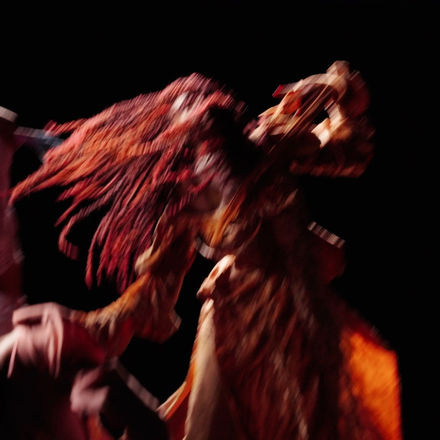

Yewande 103
nurture tender,
compassionate, creative encounters.
Our work first lives in our bodies.
We create spaces that are responsive,
care-centred, and inclusive.
Themes of repair, loss, joy, and intimacy
shape what we do.
We hold multiplicity and intersectionality
at the heart of our practice.

Who We Are
Yewande 103 (Y103) is a Black, disabled-led, parent-led dance organisation founded in 2020 by artist and writer Alexandrina Yewande Hemsley.
Yewande is Alexandrina’s Yorùbá middle name, passed down through the women in their family. It was also the name of an ancestor who ran away from slave traders in Nigeria. She hid, survived, and lived to be 103 years old. The name, meaning “mother has returned”, grounds the organisation in cyclical, nurturing, and creative approaches to practice.
At our heart, we are passionate about enlivened, sensitive, caring, and inclusive frameworks. This ethos shapes everything we do, from performance and film to workshops, publications, and wider artist and producer development projects.
What Matters To Us
Yewande 103 is committed to creating spaces that connect dance with wellbeing, creativity, and social impact.
We facilitate movement and creative writing workshops in community and social healthcare spaces and instigate interdisciplinary projects within contemporary dance, film, and publications. Uniting these strands is our advocacy for inclusion and equity of diverse voices within the cultural sector, with a particular focus on transforming opportunities for people of colour with long-term health conditions.
There is a tender determination to uphold and explore intergenerational, cyclical patterns of expression and repair, shaping work that honours resilience, care, and human connection.
How We Work
We combine dance improvisation, creative writing, and reflective tasks, underpinned by a deep commitment to accessibility, care, compassion, and conversation.
Through our practice, we help artists, audiences, and organisations reconnect to their bodies and imagine new, equitable futures, whether through workshops, consultancy, or performance.



Yewande 103 interweaves performance, film, workshops, creative engagement, and consultancy, creating care-centred spaces where participants can engage fully with their bodies and imagination.
Learn more about our current projects and upcoming work, including the intergenerational live performance Many Lifetimes.
Our Work

About Alexandrina

Alexandrina Yewande Hemsley
Founder and Artistic Director
The company is led by Alexandrina Hemsley whose creative practice lands in the fluid spaces of dance, choreography, writing, facilitating and advocacy. Alexandrina interests are both enduring and in expansive states of flux – or just in connection/relation to the processes within life and within living. They deep dive towards the sensorial, the bodily, the multiple subjective positions of self – and self in intimate relation to self and other selves – as ways to find breath and voice amidst the unjust and inequitable.
Alexandrina works with intricate improvisation scores and vivid performance environments which insist on conjuring embodied enquiries into a multiplicity of voices. This includes work within organisations around anti-racism, anti-ableism and embodied advocacy. It is a life long, nuanced undertaking.
Alexandrina has performed and choreographed nationally and internationally since 2009. Her work has been commissioned by and presented at Sadler’s Wells, The British Museum, Battersea Arts Centre, Southbank Centre, Cambridge Junction, MDI, South East Dance, Chisenhale Dance Space and The Yard Theatre, TheaterForman, Dance City and more. Her critical writing has been published by Sick of The Fringe, an introduction into Selina Thompson’s Salt (Faber & Faber), SPILL Festival and new publication exploring queering the future, Hereafter (Unbound). Other publishing includes The Silver Bandage (Bookworks) and LADA’s Live Art Almanac Vol. 5. Most recently, she has an essay, '‘Feeling My Way Through Several Beginnings’ in Performance, Dance and Political Economy - Bodies at the End of the World, Eds. Katerina Paramana and Anita Gonzalez (Bloomsbury Press).
Her collaborations include Project O with Jamila Johnson-Small (2010 onwards, Sadlers Wells New Wave Associates (2016-2020)) and Seke Chimutengwende (2016-2019 ) on Black Holes. She collaborated with Rosie Heafford and Helena Webb on Dad Dancing (2012-18).
Sector advocacy is a core extention of Alexandrina's creative practice as she seeks to contribute to how cultural institutions care for the bodies of their workers. She is a member of What Next? Culture Leadership Group and an Artist Advisory Group member for International Curators' Forum. She served as a trustee for Chisenhale Dance Space between 2015-2021.
There is an interdisciplinary approach that underpins what she creates, be that performances, texts, workshops or other holding spaces. Hers is a lifelong work, forever shaped by profound processing and the seeking out of reparative, embodied alternatives after/alongside violences of racism, misogyny, inadequate care and institutional failings of arts and healthcare sectors.

Alexandrina Hemsley's work is deeply layered, intimate, integrous and embodied. Alexandrina's work is a sensorial experience - a gift to the senses - offering deep reflection and opportunities to be transformed. Poetic, moving and beautiful.
Rebekah Ubuntu, Composer

Our Partners





(1).png)




Image Credits
Images 1, 2 and 5: © Andreas Greiner-Napp, 2022
Image 3: Katarzyna Perlak, Many Lifetimes 2024
Image 4: Fountain Still featuring dancer Rudzani Moleya, 2022
Image 9: Richard Moore
Image 10: Katarzyna Perlak, Many Lifetimes 2024 featuring dancer Rudzani Moleya



















